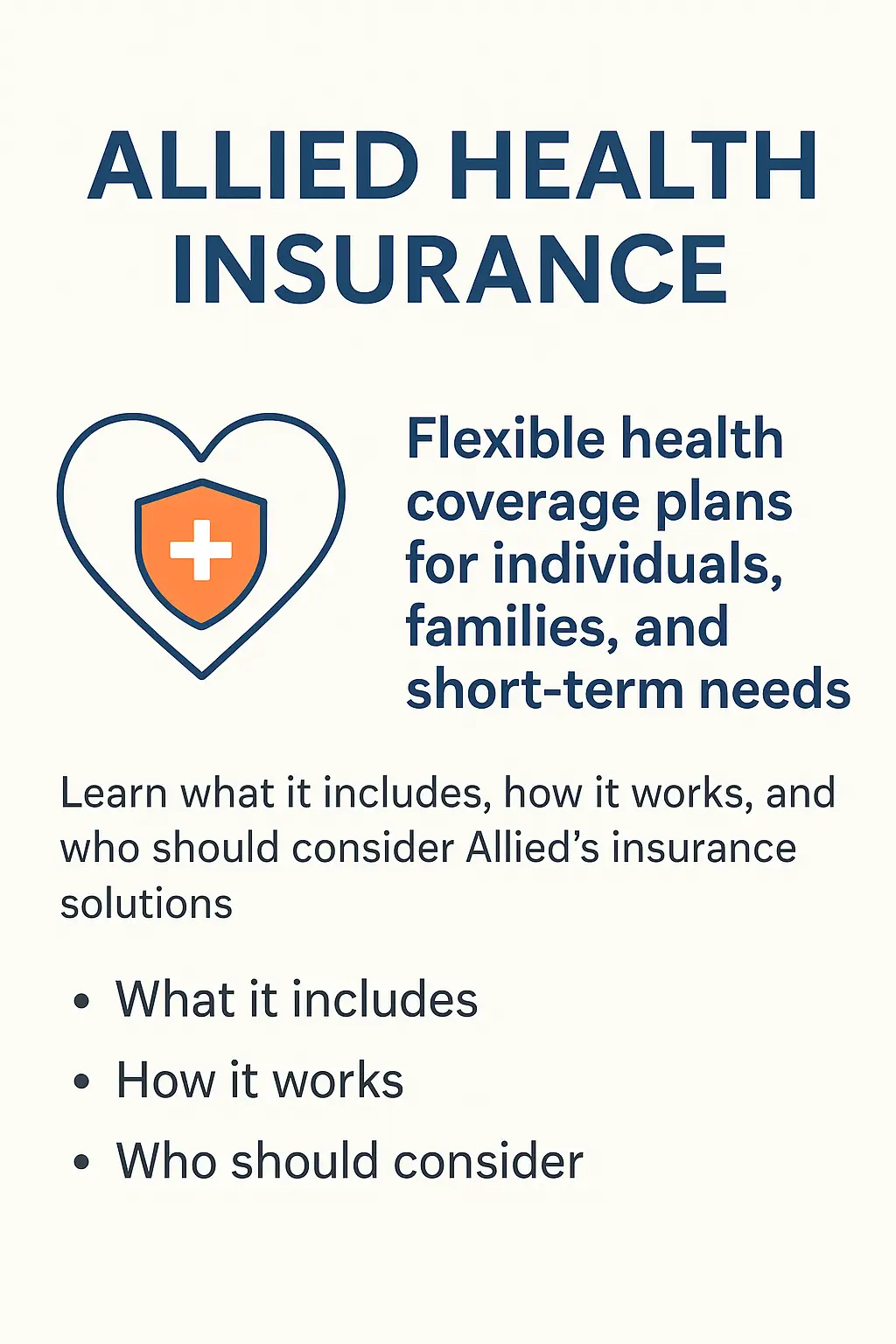
What is Allied Health Insurance?
Allied health insurance represents an essential component of the broader healthcare insurance landscape, offering coverage for a diverse range of services that are crucial for maintaining health and well-being. The primary purpose of allied health insurance is to provide financial support for various medical services that fall outside traditional health insurance plans, thereby ensuring that individuals have access to necessary care regardless of their specific health needs.
Typically, allied health insurance encompasses a variety of services, including but not limited to preventative care, therapy services, and emergency assistance. Preventative care includes screenings, immunizations, and routine check-ups, all aimed at preventing illness before it arises. Therapy services, on the other hand, cover disciplines such as physical therapy, occupational therapy, and speech therapy, which are vital for rehabilitation and improving the quality of life for those recovering from illness or injury.
Moreover, emergency assistance is a critical aspect of allied health insurance, as it provides necessary coverage for urgent medical needs that may arise unexpectedly. This type of insurance is particularly important for individuals and families who may not have access to comprehensive health plans or who require short-term coverage due to changes in employment or other life circumstances. Ultimately, allied health insurance is designed to cater to the diverse needs of a population that spans various age groups and health conditions, ensuring that essential health services remain accessible. This flexibility makes allied health insurance a valuable option for many, promoting health equity by bridging gaps typically left by standard health insurance plans.
Key Features of Allied Health Insurance Plans
Allied Health Insurance offers a range of flexible health coverage plans designed to accommodate the diverse needs of individuals and families. These plans are particularly appealing due to their customizable features, allowing policyholders to tailor their coverage according to specific requirements and circumstances. One of the significant advantages of Allied Health Insurance is the option to select different deductibles, co-pays, and coverage limits, enabling users to create a plan that aligns closely with their financial situations and healthcare needs.
For instance, individuals can opt for a higher deductible in exchange for lower monthly premiums, which may be suitable for those who do not anticipate frequent medical visits. Conversely, families with recurring healthcare needs might prefer a plan with lower deductibles and co-pays to minimize out-of-pocket expenses during regular medical care. This level of customization ensures that each plan can effectively address the unique requirements of the insured, ultimately fostering a more personalized healthcare experience.
Moreover, Allied Health Insurance plans are designed to adapt to short-term healthcare needs, making them an excellent choice for temporary life situations, such as travel or short-term job assignments. Individuals who may require travel health insurance or coverage while on the move can select plans that provide adequate protection without being tied to a long-term commitment. This flexibility is particularly beneficial for globetrotting professionals or remote workers who may face varying health needs depending on their locations.
In conclusion, the key features of Allied Health Insurance plans lie in their adaptability, allowing for personalized customization and the ability to meet short-term healthcare requirements effectively. This approach ensures that individuals and families can secure the coverage that best aligns with their lifestyles and financial considerations.
How Allied Health Insurance Works
Allied health insurance is designed to provide coverage for a range of healthcare professionals who support the diagnosis, treatment, and rehabilitation of patients. Obtaining allied health insurance typically begins with a thorough assessment of individual healthcare needs and budget considerations. Prospective policyholders can begin by researching various insurance providers that offer plans tailored to allied health services. This can include checking the coverage options for specific allied health practitioners, such as physical therapists, occupational therapists, and dietitians.
Once individuals have identified suitable insurance providers, the next step is selecting a plan that best matches their requirements. Important factors to consider during this selection process include monthly premiums, deductibles, co-payments, and what specific services are covered. It is essential for applicants to understand the intricacies of their selected plan to avoid unforeseen out-of-pocket expenses when receiving care.
After selecting a plan, the claims process comes into play when accessing treatment. Patients should check whether their chosen allied health providers are in-network to minimize costs. In-network professionals typically have negotiated rates with the insurance company, which can make treatment more affordable. If a patient opts to see an out-of-network provider, they may face higher co-pays or a reduced coverage level, making it crucial to understand these network limitations.
Finally, while most allied health insurance policies do cover a range of preventive, diagnostic, and therapeutic services, it is important for policyholders to familiarize themselves with the specific terms outlined in their plan. By comprehensively understanding these details and maintaining open communication with healthcare providers, individuals can navigate the complexities of allied health insurance more efficiently.
Who Should Consider Allied Health Insurance Solutions?
Allied health insurance solutions are designed to cater to a variety of demographics and individual situations, making it a suitable choice for many individuals and families. Young adults, particularly those at the early stages of their careers, may find allied health insurance highly beneficial. As they often face changing life circumstances, such as transitioning from college to the workforce or exploring freelance opportunities, flexible coverage options can adapt to their evolving needs without the constraints of traditional health plans.
Families, especially those with children, also stand to gain from allied health insurance. This type of coverage provides essential support as families navigate diverse health care requirements and the potential for unexpected medical expenses. With this insurance, families can select plans that accommodate pediatric care and preventive services, ensuring that all family members have access to necessary health resources.
Freelancers and self-employed individuals represent another segment that can significantly benefit from allied health insurance options. Given their unconventional work schedules and the absence of employer-backed health benefits, having a versatile health coverage solution is crucial. Allied health insurance allows these workers to tailor their health plans according to the demands of gig-based employment, providing them with security during fluctuating income periods.
Moreover, retirees or those approaching retirement can leverage allied health insurance as a bridging solution between employer-sponsored health benefits and Medicare. For retirees who might still be working part-time or transitioning into full retirement, allied health insurance can serve as a reliable safety net during this pivotal period. Additionally, individuals experiencing temporary relocations or job transitions should consider how allied health insurance can offer continuity of care when traditional options may be limited or unavailable.
Overall, allied health insurance presents a valuable coverage option for a diverse range of individuals, adapting to unique and changing life circumstances.


